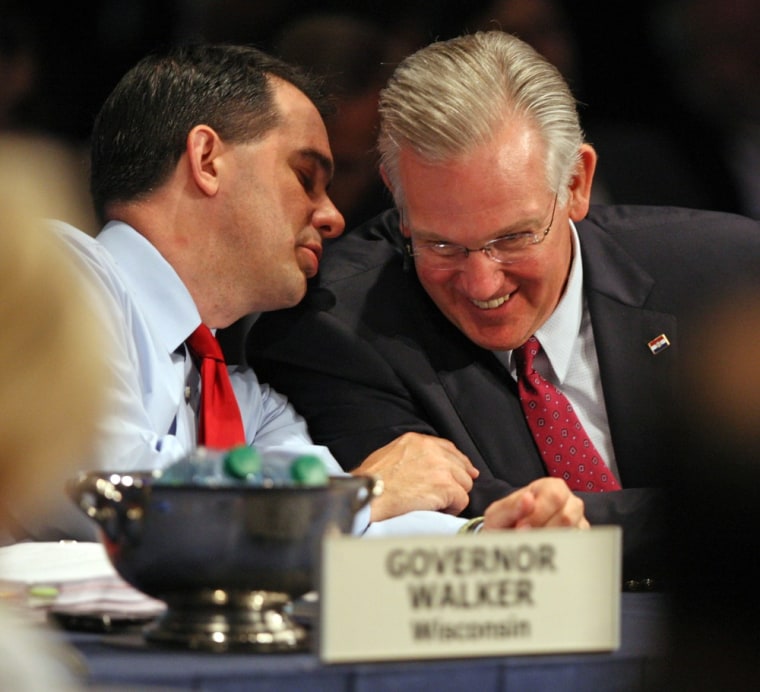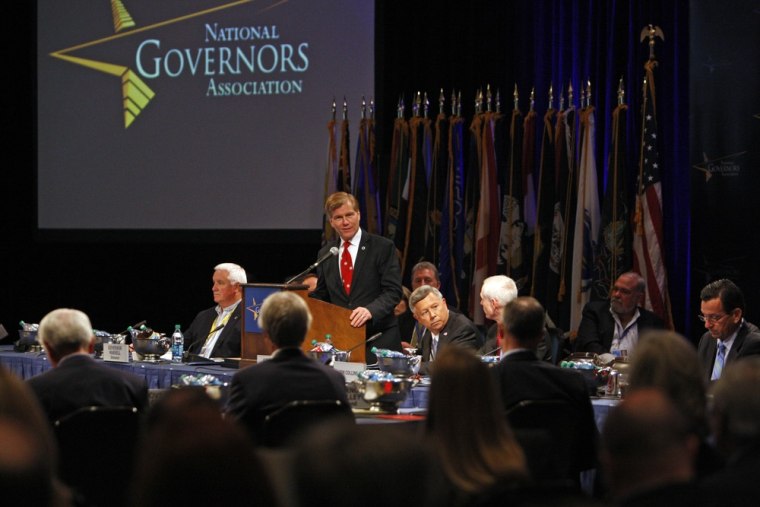The Supreme Court decision allowing U.S. states to opt out of expanding Medicaid, the health insurance program for the poor, is pitting governor against governor, with Democrats accusing Republicans of being more concerned with election-year politics than solving healthcare problems.
The issue that dominated the annual National Governors Association meeting this weekend in the historic Virginia town of Williamsburg was the court's ruling that Congress cannot penalize states who refuse to enroll a wider group of people in Medicaid, which is operated by states with federal reimbursements.
The Affordable Care Act, which would expand coverage to families with incomes of up to about $30,000, had directed Congress to withhold Medicaid funds from a state that did not expand the expensive program, which already can take up to a third of state spending.
In the two weeks since the court's decision, five Republican governors have opted out of expanding their states' programs and at least four more are leaning toward the same. Many more are undecided. These governors say they were caught by surprise after expecting the court to either strike down or uphold the entire law that they derisively call "Obamacare."
"We're going to make a very careful review of it and do what I think is best for the people of Pennsylvania," Gov. Tom Corbett, a Republican who came into office during the party's strong showing in the 2010 elections, told Reuters on the sidelines of the conference. "The Supreme Court decision changed the dynamic."
He bristled at the notion, offered by Democrats, that he was only half-heartedly considering the option to appease political supporters, saying he would not "comment on other governors criticizing the governors who are taking their time to review this."
Democrats say the extra federal money attached to the expansion will prove too good for most governors to pass up, especially as Medicaid and other healthcare costs continue to soar. Under the healthcare law, states will be reimbursed 100 percent for anyone who enrolls during the expansion. That rate will eventually taper off, but only to 90 percent.
Vermont Gov. Peter Shumlin, a Democrat, said Republicans will criticize the Medicaid directive but then accept the additional money.
"My guess is that they will beat up the president for passing a great bill until he's re-elected and then join up and take the money because they know it's the best thing for their states," he told Reuters.

Some states already grant benefits to more people than the federal Medicaid program covers and consider the Affordable Care Act a reprieve from costs they have shouldered alone.
"The Republicans don't really mean what they're saying. If in fact this law is enacted as of 2014, I urge every Republican governor who says they won't take the money after the election to resign if they end up taking the money," Connecticut Gov. Dannel Malloy, a Democrat, said. "It's far beyond posturing. They're trying to impact a presidential election by telling untruths."
For Republicans, though, the presidential election affects their decisions on the expansion. Gov. Mary Fallin of Oklahoma told reporters she would decide on the option before the election but noted the presumptive Republican presidential nominee, Mitt Romney, has said he would repeal the law.
Her fellow Republican, Virginia Gov. Bob McDonnell, a rising star in the party, would not commit to a timeframe for expanding Medicaid or for deciding on creating a state-run exchange for private insurance. His state was the first of 26 to sue the federal government over the law.
"The presidential race does impact the healthcare decision, because I don't want to spend any taxpayer money — either federal taxpayers or state taxpayers' — in building an exchange or expanding a program that may look dramatically different in six months," McDonnell said at a news conferences.
Delaware Gov. Jack Markell, set to head the governors' group, embraces the expansion as the most prudent spending choice. If more people have insurance, fewer uninsured people will turn to expensive emergency rooms to treat minor issues and pass the bill onto taxpayers, the Democrat said.
"We have to understand there is a really significant cost of doing nothing and it's the cost of uncompensated care," he said in an interview.
While the governors meeting is intended as a bipartisan exchange of ideas, Markell said that the weekend's interactions would have little influence on his decision.
"Gov. McDonnell and I have fundamentally different approaches to the expansion, and my guess is at the end of the day, he and I are... going to stay where we are," he told a news conference.
